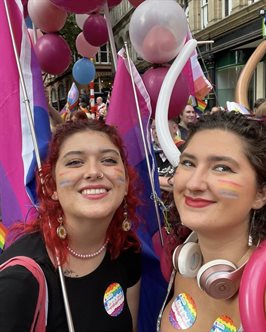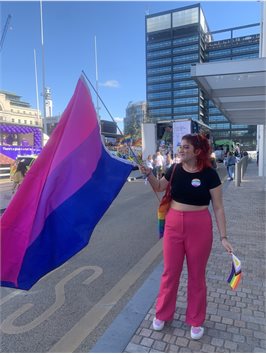LGBTQ+ History Month starts today
This month is LGBTQ+ History Month, an annual observance of lesbian, gay, bisexual, transgender, and queer history, that takes place throughout the UK every February. This is an important opportunity to celebrate and increase visibility of LGBTQ+ people, their histories and their lived experiences and raise awareness among the University community. Join our exciting programme of events, open to all students, to celebrate and commemorate LGBTQ+ history.
Book to attend an LGBTQ+ History Month event
One of our student content shapers Arianna shares what LGBTQ+ History Month means to her...
I grew up in a country dominated by strong catholic morals and a list of topics that you’re taught to avoid. Like that thing without a name that everyone grows up knowing, which filled the room with awkward silence every time the conversation shifted close to it. And even when that thing without a name started to take shape in my head – thanks to social media and the few bad examples I could find on TV – it remained abstract, far from reach. Then I left my small town, the whispers stopped following me around, I met people that knew more than I did, and that thing without a name finally got a name. And a shape. And many, many colours. That was the moment I realised the importance of finding your own community.
 The month of February, in the UK, is dedicated to LGBT+ History Month. These weeks are meant to celebrate the members of this community, the achievements reached so far, the battles that were won and those that are still worth fighting for. Founded in 2004 by School’s OUT co-chairs Paul Patrick and Professor Emeritus Sue Sanders, every February it focuses its lenses on a specific topic. This year, the chosen headline was #BehindTheLens, dedicated to the contribution of LGBT+ people in cinema, from directors and producers to make-up artists and lighting directors. In a time where queer characters and stories are finally starting to affirm their presence in the media, it’s important to pay attention to those who – behind the screen – constantly help and push to make it possible.
The month of February, in the UK, is dedicated to LGBT+ History Month. These weeks are meant to celebrate the members of this community, the achievements reached so far, the battles that were won and those that are still worth fighting for. Founded in 2004 by School’s OUT co-chairs Paul Patrick and Professor Emeritus Sue Sanders, every February it focuses its lenses on a specific topic. This year, the chosen headline was #BehindTheLens, dedicated to the contribution of LGBT+ people in cinema, from directors and producers to make-up artists and lighting directors. In a time where queer characters and stories are finally starting to affirm their presence in the media, it’s important to pay attention to those who – behind the screen – constantly help and push to make it possible.
It’s also important to remember that we got to the point where it’s possible for us to live our true selves freely and loudly because of the sacrifices of those who came before us. Honouring their memory, proudly showing off the colours we inherited from them, and telling their stories is the least we can do. But even more than that, it’s important to remember that the fight for recognition is not over yet.
 The 2021 Census was the first in 200 years to recognize LGBTQ+ people, reporting the presence of more than 1.5 million members of the community in the UK. However, according to Stonewall’s Home and Communities Report, half of LGBT people (52%) experienced depression in the last year, one in seven (14%) avoid seeking healthcare for fear of discrimination from staff, and almost half of trans people (46 %) have thought about taking their own life in the last year. And this is just the peak of the iceberg.
The 2021 Census was the first in 200 years to recognize LGBTQ+ people, reporting the presence of more than 1.5 million members of the community in the UK. However, according to Stonewall’s Home and Communities Report, half of LGBT people (52%) experienced depression in the last year, one in seven (14%) avoid seeking healthcare for fear of discrimination from staff, and almost half of trans people (46 %) have thought about taking their own life in the last year. And this is just the peak of the iceberg.
This is the reason why it’s important for us, today and for this month, to celebrate. To embrace the sense of hope, fulfilment and belonging that the successful stories leave us. To remember and respect the more unsuccessful ones. And to remind ourselves that that thing without a name does, in fact, have a name. And a thousand different faces. And even when we feel alone, abandoned or isolated, there is someone out there who went through the exact same thing and survived.
So, this month, celebrate your identity, read those books and watch those films that tell our stories, and take time to focus on your mental health and the health of the people around you. And remember that, as the amazing Marsha P. Johnson said, 'history isn't something you look back at and say it was inevitable. It happens because people make decisions that are sometimes very impulsive and of the moment, but those moments are cumulative realities.'